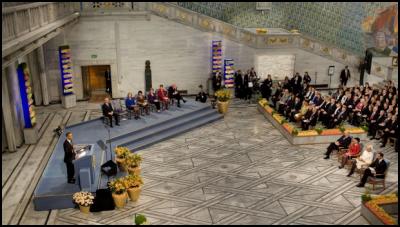Binoy Kampmark: Just Wars and Obama’s Nobel
Just Wars and Obama’s Nobel

Click for big
version
US President Obama speaks upon the reception
of his Nobel Prize in Oslo
(Image: White House photo,
Pete Souza, 12/10/09)
The greatest example of how peace prizes can sometimes morph into war accolades was given by President Barack Obama in his Nobel Peace Prize address. Far from being a message about peace, ‘A Just and Lasting Peace’ was a discourse on just war, a ceremonial on necessary conflicts and moral imperatives. The figures of pacifism and passive resistance were buried (again). Martin Luther King, Jr. and Gandhi were cited with praise, and duly dismissed. As a head of state bound by the obligation of defending his nation, Obama could not ‘be guided by their examples alone.’ White House Press Secretary Robert Gibbs had given us advanced warning of this ritual. Obama, he suggested, would ‘recognise that he doesn’t belong in the same discussion as Mandela and Mother Teresa.’
A similar speech given by the previous U.S. president would have enraged those keen to highlight the irresistible allure of war to Republican hawks and liberty mad neoconservatives. But the President was treating us to what, in some ways, is something more sinister, structured and measured. Countries had to wage war for justice, current considerations requiring a new appraisal of the institution and ‘imperatives of a just peace’. Justice is determined by the dictates of U.S. interests, or as Obama terms it, ‘enlightened self-interest’. U.S. interests are surely just, coded in the genetic framework of the country. Ergo, U.S. wars are inherently just.
Christian theology, which did much to refine the notion of just war, was always a bit hazy on the issue of how such a state of affairs could ever be ascertained. St. Thomas Aquinas gave us a few clues, a doctrine cobbled together from precedents in antiquity. Obama give his version of it. A war is just if ‘waged as a last resort or in self-defense; if the forced used is proportional, and if, whenever possible, civilians are spared from violence.’ Such an identification becomes problematic when all sides believe that God, or justice, is on their side. The fact that Allah is invariably co-opted by the opposition suggests that just wars are cosmetic variants on wars of self-interest, pure and simple.
International lawyers have not come much farther. The doctrine of humanitarian intervention remains sketchy and hard to apply. That it continues to remain so is unsurprising – the U.S. and its NATO allies are firmly embedded in Afghanistan, but have little desire to mire themselves on the African continent. Some situations are evidently more just, or dare we say it, ‘enlightened’, than others.
Something which Obama could seemingly get away with, and something Bush may well have had dreams of doing so, was creating the security ‘architecture’ that resonated to the tunes of empire but masqueraded as the plodding efforts of peace keeping. It was not merely the force of international institutions and treaties, but US power that underwrote ‘global security for more than six decades’. What we have here is a pantomime of Bush, in superior academic dress. While not larding his speech with such notion as an ‘axis of evil’, we still have those usual suspects peeking around the corners of Obama’s vision. Wars can be just, but those waged by a nuclear armed North Korea would not be. Iran, for one, should never be allowed to have such a deterrent. Such interests are evidently not so ‘enlightened’.
In Obama’s speech, we again see the messianic impulses that have landed the U.S. in more than just hot water in the last eight years. It is the security craving that drove the U.S. counter-revolutionary efforts from 1950 onwards, when the gospel of NSC-68 guided the high priests of security. The near hysterical assessments of Soviet power in that document plot the deepening involvement of the U.S. in ‘low-intensity’ wars that led, ultimately, to a bloody defeat in Vietnam. Obama, as Amnesty International’s Larry Cox explains, has ‘created a false choice between having to speak out forcefully on human rights or being pragmatic and getting results on the other issues’.
If the Norwegian Nobel Selection committee thought that such an award would give Obama the impetus to change American foreign policy, it is mistaken. War, and the muscle of American military might, is here to stay, however enlightened its purpose. What seems to matter more to Obama, is the imperative of observing ‘standards’. Even now, that observance seems stretched.
Binoy Kampmark was a Commonwealth Scholar at Selwyn College, Cambridge. He lectures at RMIT University, Melbourne. Email: bkampmark@gmail.com


 Martin LeFevre - Meditations: Animal Encounters During Meditative States
Martin LeFevre - Meditations: Animal Encounters During Meditative States Ian Powell: Gisborne Hospital Senior Doctors Strike Highlights Important Health System Issues
Ian Powell: Gisborne Hospital Senior Doctors Strike Highlights Important Health System Issues Keith Rankin: Who, Neither Politician Nor Monarch, Executed 100,000 Civilians In A Single Night?
Keith Rankin: Who, Neither Politician Nor Monarch, Executed 100,000 Civilians In A Single Night? Eugene Doyle: Writing In The Time Of Genocide
Eugene Doyle: Writing In The Time Of Genocide Gordon Campbell: On Wealth Taxes And Capital Flight
Gordon Campbell: On Wealth Taxes And Capital Flight Ian Powell: Why New Zealand Should Recognise Palestine
Ian Powell: Why New Zealand Should Recognise Palestine